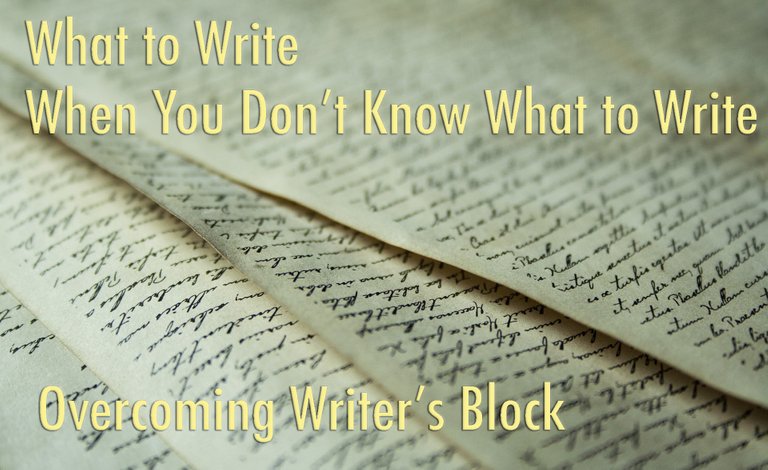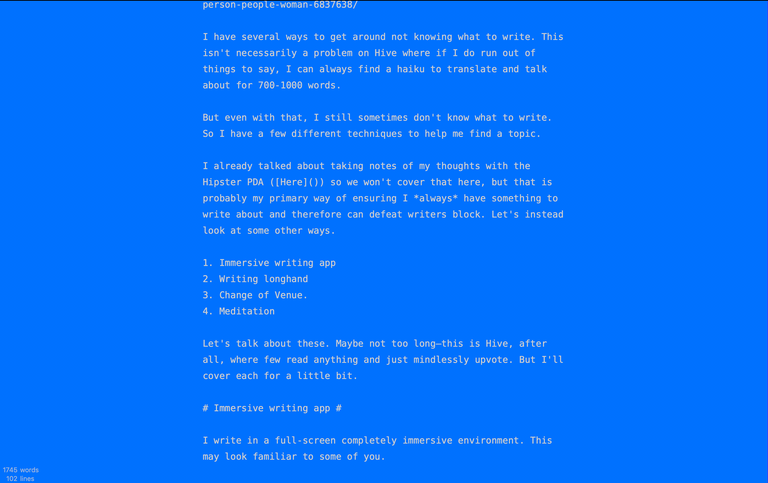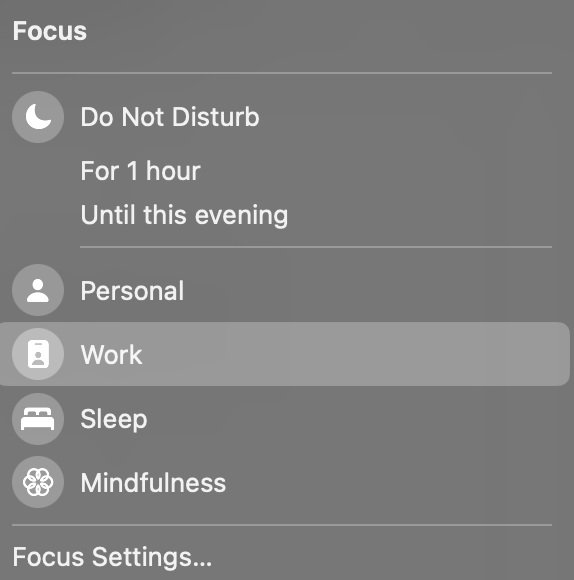
So...what to write when you don't know what to write? Tough question. I've been writing on Hive for 5.5 years and on various blogs in general for over 25 years (since starting my first website—we didn't call them blogs then—way back in 1996). In all that time I've come up with a number of ways to help me write. I'm still always looking at ways to improve things for myself, but let's go over what I do that works for me now.
Some people would call it writer's block. It's when you sit down at your computer to write something, but no words come to mind. You just can't think of anything to write, be it additions to a previous piece or story, edits to a draft you have sitting around from days or weeks before, or something entirely new: your mind is completely blank.
I don't believe in writer's block. I think we always have something to say. There are two basic problems. First: sometimes people get hung up on writing one specific thing but they can't think of any way to make any progress on it. That single-mindedness that can get us stuck and lead to frustration. Second: Our old friend perfectionism raises its ugly head and that urge to write something that's perfect prevents us from writing at all. I'm going to tackle both of these as well as some others.

Photo by Nataliya Vaitkevich
I have several ways to get around not knowing what to write. This isn't necessarily a problem on Hive where if I do run out of things to say, I can always find a haiku to translate and talk about for 700-1000 words.
But even with that, I still sometimes don't know what to write. So I have a few different techniques to help me find a topic.
I already talked about taking notes of my thoughts with the Hipster PDA (Here) so we won't cover that here, but that is probably my primary way of ensuring I always have something to write about and therefore can defeat writers block. Let's instead look at some other ways.
- Immersive writing app
- Writing longhand
- Change of Venue.
- Meditation
Let's talk about these. Maybe not too long—this is Hive, after all, where few read anything and just mindlessly upvote. But I'll cover each for a little bit.

Immersive writing app
I write in a full-screen completely immersive environment. This may look familiar to some of you.

I use an app called WriteRoom on my Mac. It lets me set my own colors and fonts, so I choose to mimic the old DOS Wordperfect 5 setup. I think the shade of blue is not completely right, but oh well, it's close enough.
I also turn on my "Work" focus.

Focus modes are something Apple added a version or two ago where you can silence all notifications, sounds, etc. These can be customized to allow some things through if you need that. I also own an iPhone and my focus mode also activates there so it won't bother me. If you have an Apple device and want help setting the focus mode, let me know in the comments and I will write a short guide.
Locking myself into a full-screen experience forces me to either be bored or to write. That's a little tip I picked up from Sandman author Neil Gaiman. He writes all his books by longhand in a cafe. He will go to the cafe at the start of the day, bringing only a journal and a fountain pen and he will stay there for hours. His idea is that doing this will make him bored because he will have nothing to do. But by being bored he will be forced to entertain himself by writing. This technique seems to work shockingly well for him: he's up to dozens of published books now, as well as tons of other writing.
That leads me to my next technique...

Writing Longhand

Photo by energepic.com
Rather than Neil Gaiman, I was inspired in this one by Stephen King and Natalie Goldberg. Stephen King has written several of his books by longhand, at least one of which he also wrote by candlelight. Natalie Goldberg suggested longhand as a great method in her landmark book Writing Down the Bones.
There is a different mindset when you are writing down on paper. Editing is not so easy and writing a lot makes your hand tired, so you become less wordy, and you choose the words you do use better. Not to mention you are less distracted by all the bells and whistles on the computer, resulting in more focus on the actual writing.
I like and use fountain pens when I write longhand. Interesting, so do Gaiman, King, and Goldberg. There is something to it: writing with a fountain pen is much easier than with a ballpoint or pencil so it doesn't tire the hand out as much. A ballpoint or pencil requires at least a little downward pressure to get it to write—if it's one of those cheap Bic pens, it might demand a lot of pressure. This pressure and the tension it creates in the hand is what makes our hand tired after a page or less of writing. A good fountain pen by contrast will write without any pressure at all, meaning you simply have to guide the pen over the page and it writes by itself. This enables a lot more writing before the hand gets tired.
I don't write everything in longhand, but when the words don't come in WriteRoom, sometimes turning the computer off and doing things the analog way helps.
That may be in part due to the mental reset that comes with changing gears. And that leads to the next point...

Change of Venue

Photo by Sebastian Schuppik on Unsplash
Sometimes writing at home just proves to be impossible. There are distractions everywhere! In addition to playing a game or watching TV, or perhaps kids playing in the background, there is also cleaning we could do or other household chores. Even if we manage not to have our focus pulled away by these things, we are usually aware of them and actively ignoring them saps our willpowers. Beyond that, even if the kids are at school and the spouse at work and we have the mental room to work, sometimes the isolation just seems to sap our energy.
In cases like this, going somewhere different to work sometimes does wonders. A cafe, the park, a library. Being around people sometimes gives us the energy boost to get our minds moving.
A quick hack you could try is putting on a recording of the background noise from a cafe. You can find many of these on YouTube; if you are serious about it you can even find websites that sell high-quality recordings of this background noise. Some people swear by this. That said, the real thing is often better if it's available.
If you do change your venue like this, I suggest only taking what you need with you. Remember the example of Neil Gaiman I mentioned above, where he only takes a notebook and fountain pen to the cafe. Copy that approach. Just take a notepad and pen or just a laptop but nothing else.
These will help you, but there is one more idea I have.

Meditation

Image by Dana from Pixabay
Another reason I think people have trouble writing is that they just have too much stuff on their mind. We want to write about everything so as a result we can't focus on anything. There are many writing exercises to help tackle this problem and help narrow our focus. These have their uses, but for me I find jumping right to meditation is a great way to start.
Robert Pirsig gives a great example of being writers block by narrowing our focus in his book Zen and the Art of Motorcycle Maintenance. In it, he recalls an episode from his teaching days. He had assigned his class a paper: write a five-hundred-word essay about the United States. A girl in his class couldn't think of anything to say. So he told her to narrow it down to their city. She tried to do that but couldn't. He told her to narrow it down to the main street of the city. She went away, tried, but couldn't do it. In anger he told her to narrow it down to a single building on main street, the opera house, starting with the upper left-hand brick. The next day she turned in not a five-hundred-word essay, but a five-thousand-word essay.
Sometimes when we narrow our focus, we can find much more to say about things.
Now how does meditation help this? Meditation doesn't help empty the mind, contrary to what you may believe, but it does help us learn to ignore the mind. Our mind is like a hyperactive monkey, hoping from place to place, wanting to do everything all at once, being distracted by every shiny object, never shutting up, never standing still: hence the Buddhist term monkey mind. Making the monkey be silent is a really difficult task—almost impossible for all but monks who have been working at it for years. Most of us have no hope at making that voice be quiet, but what we can do is learn to ignore it.
I meditate twice a day anyway, in the morning and at night, but whenever I am having extra trouble writing something I'll stop what I'm doing and take a small ten minute meditation session. Doing so often unclenches something in my head and reminds me that I can ignore my mind's incessant chatter. After that short meditation sit, writing becomes much easier.

To Sum It Up
There you go: Four good techniques to help you write when you don't have anything to write. Five if you include my previous suggestion of taking notes with the Hipster PDA.
Use them wisely!
❦


 |
David LaSpina is an American photographer and translator lost in Japan, trying to capture the beauty of this country one photo at a time and searching for the perfect haiku. |
If this blog post has entertained or helped you, please follow/upvote/reblog. If you want to further support my writing, donations are welcome.
Great tips. Here's one I found that helps me: just write for 5 minutes. Really it works for anything you are avoiding. If you tell yourself you will do something just for 5 minutes, you get over the internal resistance. Once you've started and done 5 minutes, you could always do more if you wanted...and usually, you will.
By the way, I just posted my first post on hive. If you want to read it, you can check it out here: https://ecency.com/introduceyourself/@enderjeeshboss/intro-and-daily-journal-1
That's a great practice too. It works best when you are doing a stream of consciousness style, with no punctuation, no judgement, not caring about grammar or spelling, just writing whatever pops into your head.
I'll check out your post 👍
Nice tutorial. These are fantastic ways to really come up with something to write about. I tend to struggle in finding topics to write about so I'm glad I stumbled upon this piece. Many thanks.
I hope some of these ideas can help you when you are struggling.
Certainly.
Meditation is so powerful yet people, at least most of the people around me, don't want to try it. It helps so much to clear the mind and declutter thoughts. We have so much junk in the back of our minds and if we don't take a minute for ourselves we contribute to the mind fog most of us experience all the time. I know that meditation on the surface can sound like a waste of time, or the classic "I just sit there?", but it is so much more, and even when I explain to my peeps I can feel that they aren't convinced. Too bad...
I think the problem is it seems deceptively simple. Just sit. Then when people do try it, it seems incredibly hard. Too hard for something that "should be easy", so they quit, usually mumbling something like "I guess it's just not for me". I always tell these people that it's always hard, and it's boring, and that's the point. But I understand that's easy for me to say since I've been doing it so long. One paradoxically needs to practice for some time before they understand better.
I should really write a post about it sometime.
Anyway, thanks for the comment!
!PIZZA !LUV
Actually, I would say that it is easy if someone tells you exactly what to do and why. I first started meditating when I came across this streamer psychiatrist Healthy Gamer GG. Don't know if you heard of him, interesting person. With his help, I discovered so many meditation techniques. Some didn't work for me, while some clicked on my first attempt. I stuck with those of course, and I'm so grateful I did.
I encourage you to do that, I will explore this idea too, cause I know it will give value to others.
Yes, I should clarify. It is easy if one has guidance. Or maybe not easy, because meditation is never easy nor is it intended to be easy, but "easier". I daresay the majority of people who try meditation do it with no guide whatsoever, just a vague idea that they "should stop thinking" and maybe one of these "meditation" tracks they find on the net that isn't really meditation anyway but is more yoga relaxation (yoga nidra) than meditation. So then that is what leads most people to think it's too hard and then quit without ever trying again.
I haven't heard of that person but I'll look him up.
Yeah sure. What I meant by easy was that once you have the guidance you don't need to dedicate months before figuring out what to do. You get the benefits from it almost immediately. At least I'm talking from my personal experience and from what I heard from a single friend that actually decided to try it out.
(1/1) sent you LUV. | tools | discord | community | HiveWiki | NFT | <>< daily
NFT | <>< daily
Change of Venue I like this one👍 I should try it ))
I hope it helps!
I gifted $PIZZA slices here:
(1/15) @dbooster tipped @awesomeintrigue (x1)
Send $PIZZA tips in Discord via tip.cc!